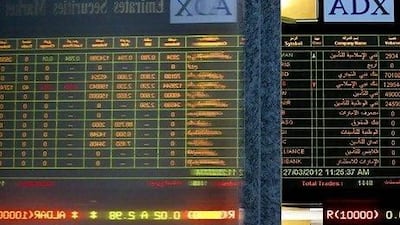Don Huber is the vice president of Franklin Templeton Investments, the global investment firm that was founded in the United States in 1947. Mr Huber, who is based in New York and was in the UAE recently to drum up investor interest, is a co-manager of a number of the firm's mutual funds, including the US$118.8 million (Dh436.3m) Franklin Global Growth Fund. His approach to the funds he manages is called contrarian rebalancing, although Mr Huber says it is a strategy that might be too daunting for the average investor to follow.
Can you explain the contrarian-rebalancing approach?
The strategy that we have is purely a bottom-up strategy, where our analysts are focused on finding companies that have the growth quality and valuation characteristics that we can own for a number of years. To add value, the way that we do it is through stock selection and we look to own companies of meaningful size. So we own 2 per cent to 3 per cent [of a company] and there are roughly 40 companies in the portfolio. A big part of our risk-management strategy is simply to manage roughly equally weighted portfolios. So the contrarian-rebalancing management comes as we own companies for multiple years and in an equally weighted portfolio. As positions move up because they've had strong investor support, that's where momentum may come in, and then we'll pare those positions and add to the smaller positions of the companies that have been lagging in terms of relative performance. So the contrarian aspect of it is that a normal investment type of approach would let a position size run up with investor momentum.
Rebalancing seems to be a catchword when investing these days. Is this a concept that was spurred on by the financial crisis?
No. We have had this approach for years. The rebalancing is what we do to manage the risk in the portfolio to keep positions from growing too large and adding too much stock specifically to the portfolio. And, conversely, letting the position side get too small to the point where they are not adding anything to the portfolio in terms of diversification. We look across sectors and across regions. And we own [shares in] companies in most sectors, in most countries and most regions.
What do you look for in a company before you invest in it?
The common characteristics that we look for in our companies are growth quality and valuation. From a growth standpoint, we are focused on companies that have sustainable business models and can internally generate cash rather than be reliant on debt markets or the capital market. We also look for companies with secular growth behind their product, such as online retailing, which is gaining share in the overall retailing space as people move purchases and transactions online.
Would the contrarian-rebalancing investment approach work for the average investor?
I think the components of what we add are fairly straightforward. The underlying key is research and doing research in a fair amount of depth. A part of the research that we do before we make these meaningful commitments to companies that we hope to own for a number of years is not only looking at the financial statements and talking to management, but talking to outside experts in a regulated industry, people who are familiar with the regulatory process, talking where we can with customers, with suppliers, with competitors; really drawing on a wide body of knowledge before we make a commitment to a company. We have nine analysts focused on identifying this full-time. So for one person to do what nine analysts do full-time would be very challenging.
As a private investor, do you follow this method yourself?
I'm a believer in long-term investing.
What do you personally invest in?
I'd rather not venture into that.


